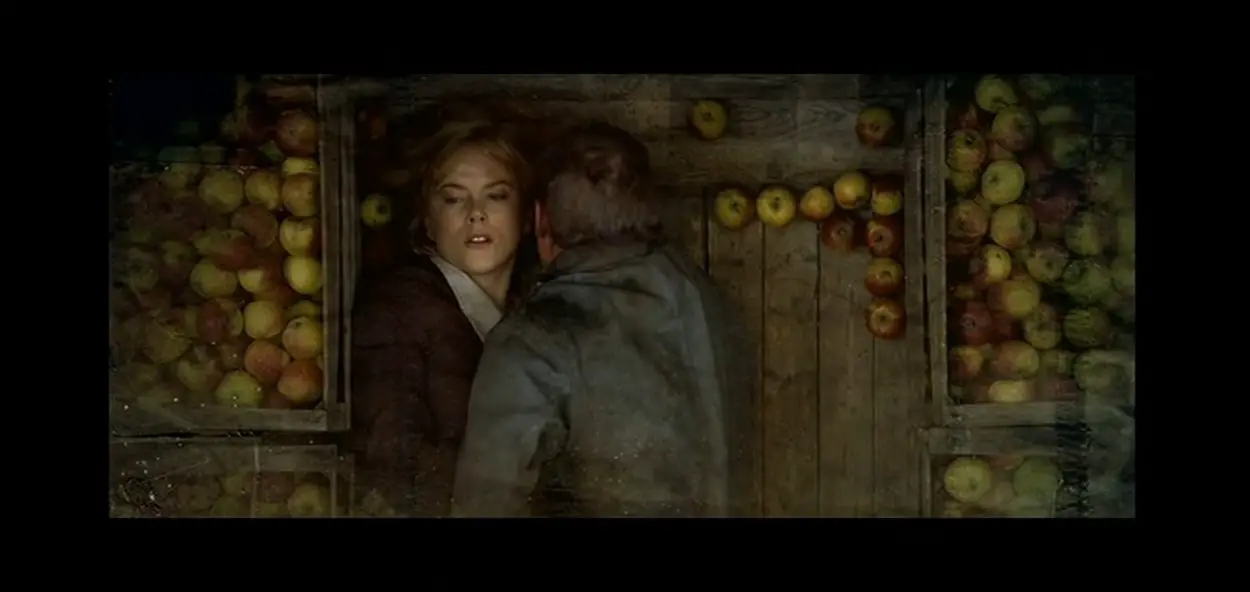One of the most essential ideals instilled into children in America is that the founding fathers drafted the U.S. Constitution on the basis that all men had the natural rights of “life, liberty, and the pursuit of happiness”. However, in practice, these constitutional rights were, and still are, felt unevenly between people in America. In Lars Von Trier’s film, Dogville (2003), this lack of achieving those constitutional rights is expressed heavily within the period of the Great Depression that the film takes place in.
Our film is narrated frequently by an omniscient narrator, played by John Hurt, as he describes the titular town of Dogville and its various inhabitants. The town is described similar to a shantytown and is isolated from the rest of the United States. While the viewing audience observes the town’s geography in chalk outlines within a stage throughout the entire film, making it one of the most play-like film sets ever made, none of the characters in the film notice this simplicity and act as they would in normal buildings, not being able to see or hear everything that happens outside.
After a prologue that sets up the history of this town and its various inhabitants, our main character Grace Mulligan, portrayed by Nicole Kidman, arrives in the town after lengthy gunfire was heard by the town’s inhabitants. As the citizens of Dogville debate amongst themselves if Grace should be kept hidden in their town, or given to the gangster that previously searched for her and asked the residents of Dogville if they’ve seen her there, Thomas Edison Jr, played by Paul Bettany, suggests to Grace as the symbolic leader the that she offers services to the residents of the town in order to gain a positive reputation and trust from the inhabitants of Dogville. Later in the film, Edison decides to gather a meeting of all the residents at a church, implementing a democratic voting system for Grace to either stay in Dogville or leave. After they all vote to keep Grace hidden in Dogville, the remainder of the film showcases the increasingly selfish and harsh nature of the town as they take advantage of her as both a laborer and a woman.
The film takes a great amount of running time to showcase the strenuous and cyclical workdays that Grace participates in order to be seen as an equal within the town. These scenes of labor reveal the work-oriented mindset that America started to idolize after the industrial revolution caused a demand for a large citizen workforce. However, when the Great Depression hit almost a century later, many family members lost their jobs and those that continued to keep their jobs had to deal with lower wages and less-favorable job opportunities as businesses lost profits during the economic turmoil. With this economic crisis, immigrants arriving in America suffered a lack of chance to gain a career and support themselves and the family they traveled with, just as Grace, a newcomer to the very insular town of Dogville, has had to deal with unwanted tasks of the town due to the lack of any alternative work path that would be more appealing. While the people within Dogville admire Grace’s presence and work within the town during the first few weeks she’s there, just as Americans appreciate the hard work of laborers around the country, this appreciation soon turns into coercion.
After encountering more questioning from outside forces such as the police putting up wanted posters of Grace within Dogville, the town starts to take advantage of Grace by giving her more duties with less compensation in order to remain there. Just as laborers during the Depression were coerced into a worse working situation and couldn’t rally together to demand better rights, Grace is forced to work longer hours with additional work in which her safety is threatened if she fails to satisfy her oppressive bosses.
The main characteristics of Dogville are introduced as paradoxical throughout the entire film based on what’s introduced in the prologue chapter. The audience is told by the narrator that the Elm Street that runs through the town was named after a species of tree that had never grown there, that Thomas Edison Jr. is trying to teach the town about morality despite their coldness towards Grace, and that Edison Jr. is a writer without any completed works to reflect that hobby.
Despite these occurrences being viewed as seemingly trivial individually, especially the morality that Edison Jr. prides himself in teaching within Dogville, when combined together and left unchanged for as long as they are within the film, Dogville itself becomes an expression about the United States own contradictions, both past, and present, in terms of how the country views itself compared to the actions it takes part in. Ironically, the founding fathers believed in “life, liberty, and the pursuit of happiness” despite allowing the institution of Slavery to continue almost an entire decade after the Constitution was drafted, women weren’t given suffrage until a decade and a half after the Constitution was drafted, and that interracial and gay marriage wasn’t legalized until 2 centuries after the Constitution was drafted.
These small amounts of numerous other unmentioned real-life liberties were similarly kept from being enacted within the freedom-obsessed United States of the real world just as they were in the morality-centered town of Dogville. While the workload is increased as part of an incentive for her stay there and not be turned in to either the law or the mysterious gangster that had arrived earlier, Grace is eventually sexually assaulted by many of the male members of the town. The act of sexual abuse is seen as the ultimate control over Grace as a human being as the right to one’s body, the most basic right all human beings deserve, is stolen from her without her consent. Furthermore, Dogville’s sexual domineering over Grace can be applicable to the struggle for women’s rights by female activists in the U.S. in their search to have the personal right to abortion. Accordingly, the right of abortion can allow a woman the self-rule to not go through childbirth, an inherently female struggle that sometimes a result of non-consensual sex, is often taken away from a male society based on pure moral relativism, often not acknowledging that women have to deal with the physiological struggles of going through the birthing process, unlike men. During this process of taking away the bodily rights of Grace, Dogville becomes less of a self-isolated town that tries to go by in its own mundane ideals of morals and work ethic and is instead fully uncovered as the ultimate antithesis of positively-viewed United States characteristics.

Inevitably, the town betrays the promise to Grace and gives her up to the gangster that searched for her in the beginning, it’s revealed that she escaped from a gang that her father controlled in order to be away from his criminal activities. After a debate in which Grace argues that the town was only reacting to the hazardous presence of outside forces with misguided perspectives while her father argues that she is too prideful and that Dogville needs to be punished, Grace is eventually given the choice of enacting Dogville’s fate by her father. After reflecting on all the pain caused upon her by the town, she decides that Dogville needs to be destroyed, getting back all the power she lost over the films running time to the menacing township. While the mob destroys and kills the town of Dogville, Grace personally executes Thomas Edison Jr, the singular figure that allowed the pain of her increased workload and sexual assaults being carried out. And as the gang, prepares to kill the fake dog within the town, Grace convinces them to keep it alive, expressing that animals aren’t capable of evil and committing heinous acts that mankind often allows to occur.
The film then leads to a powerful credit sequence of dust bowl/poverty images played over “Young Americans” by David Bowie. The song’s United States-centered lyrics showcase the inequality that is felt by the wealth disparity highlighted in the pictures during this credits sequence, revealing that the U.S. has always had problems being able to provide its citizens a stable life. And as the film’s credits conclude, the audience then realizes that the concept of “The American Dream” is little more than a facade wrapped in blind nationalistic pride.



